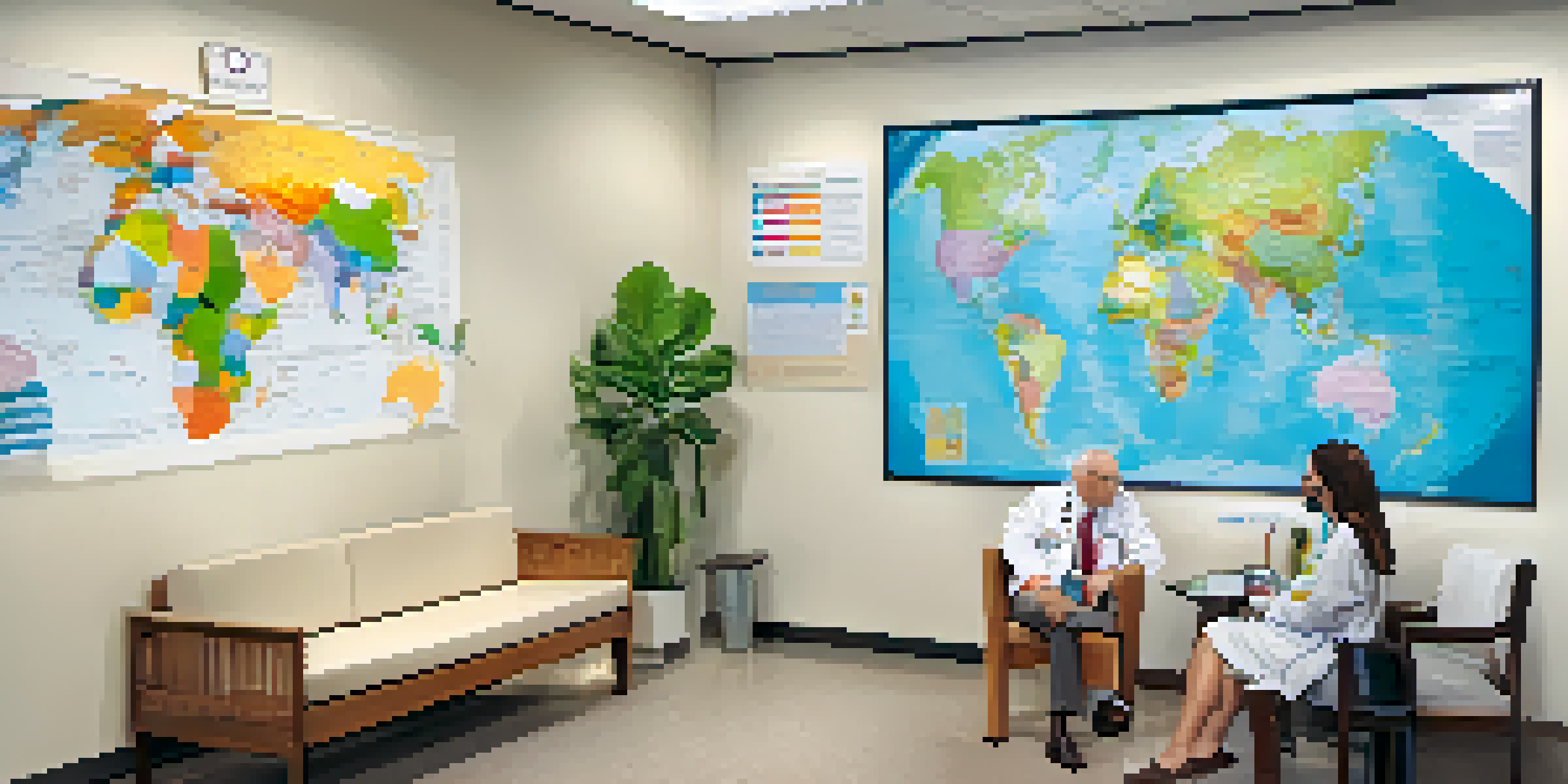Essential Vaccinations for Safe International Travel

Understanding the Importance of Vaccinations for Travelers
When planning international travel, vaccinations are crucial for protecting your health. Many countries have unique health risks that can be mitigated through proper immunization. For instance, diseases such as yellow fever or typhoid may be prevalent in certain regions, making vaccinations essential for safe travel.
Vaccination is the key to protecting both individual and public health.
Travel vaccinations not only shield you from illness but also contribute to global health by preventing outbreaks. By getting vaccinated, you help protect not just yourself, but also the communities you visit. This collective effort can significantly reduce the spread of infectious diseases worldwide.
Ultimately, understanding the importance of vaccinations can enhance your travel experience. Feeling secure about your health allows you to enjoy your trip without unnecessary worry. So, before you pack your bags, consider the vaccinations that can keep you healthy on your journey.
Common Vaccinations Recommended for Travelers
Some vaccinations are universally recommended for international travelers. These include vaccines for hepatitis A and B, measles, mumps, and rubella (MMR), and influenza. Depending on your destination, you may need additional vaccines, like those for meningitis or rabies.

For instance, if you're heading to sub-Saharan Africa, a yellow fever vaccination might be required. Similarly, if you're traveling to Southeast Asia, a typhoid vaccine could be vital. It's essential to research your destination to determine which vaccinations are necessary.
Vaccinations Protect Your Health
Travel vaccinations are essential for safeguarding your health against region-specific diseases while exploring new destinations.
Consulting with a healthcare professional can help you create a personalized vaccination plan. They can provide insights on which vaccines you might need based on your travel itinerary. This tailored approach ensures you stay protected against regional health risks.
Timing Your Vaccinations: When to Get Vaccinated
Timing is key when it comes to vaccinations for travel. Many vaccines require time to become effective, so it’s essential to plan accordingly. For example, some vaccinations may need to be administered weeks before your departure to ensure full immunity.
Traveling – it leaves you speechless, then turns you into a storyteller, but health is the first chapter of every journey.
Additionally, certain vaccines may require multiple doses spaced out over time. For instance, the hepatitis B vaccine often involves a series of shots. Starting your vaccination process early can help you avoid last-minute stress as your travel date approaches.
To stay organized, create a timeline for your vaccinations. This way, you can ensure that you’re fully protected well before you embark on your journey. Planning ahead can make your travel experience much smoother and more enjoyable.
Finding the Right Vaccination Clinic or Provider
Choosing the right clinic for your vaccinations can make all the difference. Look for travel health clinics that specialize in immunizations for international travelers. These clinics often have the latest information on required vaccines for specific destinations.
You might also consider visiting a local pharmacy with a travel health program. Many pharmacies now offer vaccinations and can provide guidance on what you need. This convenience can save you time and ensure you receive the appropriate care.
Plan Vaccinations in Advance
Timing is crucial; many vaccines require advance planning to ensure full immunity before your trip.
Regardless of where you go, make sure to verify the credentials of the provider. A reputable clinic will have qualified professionals who can answer your questions and provide the necessary vaccinations. This peace of mind allows you to focus on enjoying your upcoming adventure.
Understanding Vaccine Side Effects and Safety
Like any medical procedure, vaccinations can have side effects, but they are generally mild. Common reactions may include soreness at the injection site, low-grade fever, or fatigue. Understanding what to expect can help alleviate any concerns you might have.
Serious side effects are rare but can occur, which is why discussing your health history with your provider is important. They can help assess your individual risk factors and provide guidance. It’s always better to be informed and prepared.
Remember, the benefits of vaccinations far outweigh the risks for most travelers. The chance of contracting a serious illness while abroad can be significantly reduced with the right immunizations. This allows you to travel confidently and focus on creating wonderful memories.
Travel Insurance: A Complement to Vaccinations
While vaccinations are vital, having travel insurance is equally important. Insurance can provide coverage for unexpected medical expenses or trip cancellations, adding an extra layer of protection. It’s a safety net that can save you from significant financial stress.
When choosing travel insurance, look for a plan that covers medical emergencies related to infectious diseases. This ensures you have support in case you do fall ill while traveling. Read the fine print to understand the coverage details before purchasing.
Stay Informed on Health Risks
Regularly check health advisories from reliable sources to stay updated on vaccination requirements and health risks at your destination.
By pairing travel insurance with vaccinations, you can travel with greater peace of mind. Knowing you’re protected against both health risks and financial setbacks allows you to embrace new experiences without worry.
Staying Updated on Travel Health Advisories
Health advisories can change rapidly, so staying updated is crucial. Before you travel, check reputable sources like the Centers for Disease Control and Prevention (CDC) or the World Health Organization (WHO) for the latest vaccination recommendations. These organizations provide valuable insights into health risks by destination.
Additionally, keep an eye on any travel alerts related to outbreaks or health concerns in your destination country. This information can be critical for making informed decisions about your travel plans. It’s always better to be prepared for potential health risks.

By staying informed, you can adjust your vaccination plans as needed. This proactive approach ensures you’re equipped to handle any challenges that may arise, allowing you to travel confidently and safely.
Conclusion: Prioritizing Health for a Safe Journey
In conclusion, prioritizing vaccinations and health precautions is essential for safe international travel. Understanding the importance of vaccinations, knowing which ones you need, and planning ahead can significantly enhance your travel experience. Your health should always come first when exploring new destinations.
As you prepare for your journey, take the time to research, consult with healthcare professionals, and stay updated on health advisories. This diligence not only protects you but also the communities you’ll visit. By doing so, you contribute to a healthier, safer world.
So, as you embark on your next adventure, remember that a little preparation can go a long way. Embrace the excitement of travel with the confidence that you’re taking the necessary steps to safeguard your health.